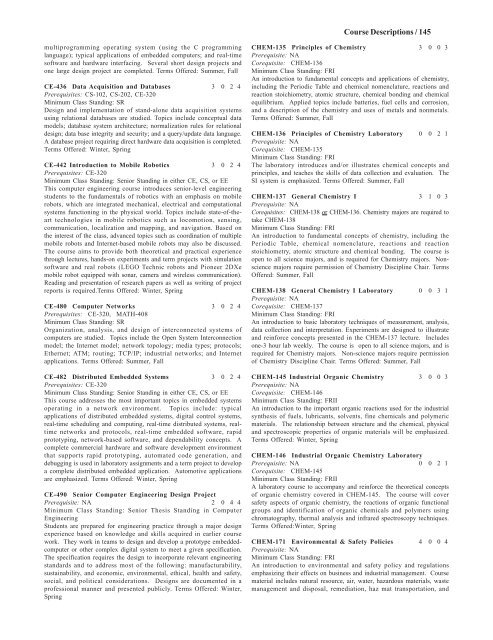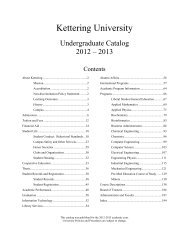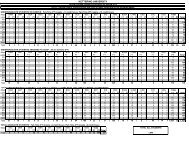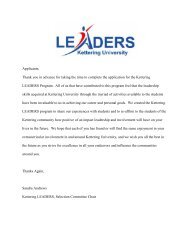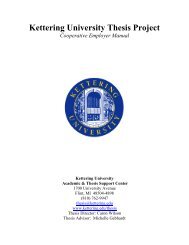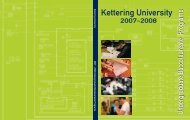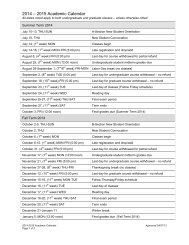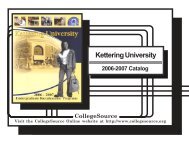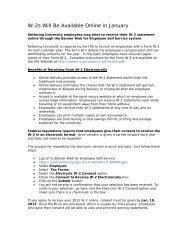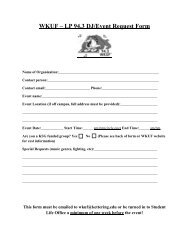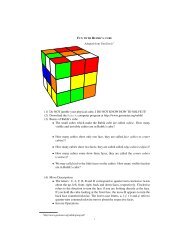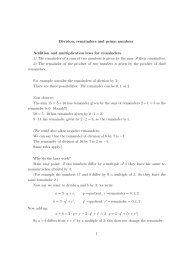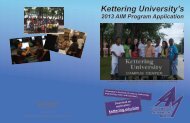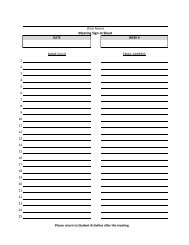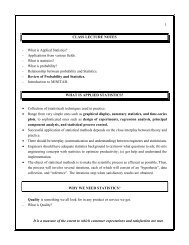2008-2009 Undergraduate Catalog - Kettering University
2008-2009 Undergraduate Catalog - Kettering University
2008-2009 Undergraduate Catalog - Kettering University
You also want an ePaper? Increase the reach of your titles
YUMPU automatically turns print PDFs into web optimized ePapers that Google loves.
Course Descriptions / 145<br />
multiprogramming operating system (using the C programming<br />
language); typical applications of embedded computers; and real-time<br />
software and hardware interfacing. Several short design projects and<br />
one large design project are completed. Terms Offered: Summer, Fall<br />
CE-436 Data Acquisition and Databases 3 0 2 4<br />
Prerequisites: CS-102, CS-202, CE-320<br />
Minimum Class Standing: SR<br />
Design and implementation of stand-alone data acquisition systems<br />
using relational databases are studied. Topics include conceptual data<br />
models; database system architecture; normalization rules for relational<br />
design; data base integrity and security; and a query/update data language.<br />
A database project requiring direct hardware data acquisition is completed.<br />
Terms Offered: Winter, Spring<br />
CE-442 Introduction to Mobile Robotics 3 0 2 4<br />
Prerequisites: CE-320<br />
Minimum Class Standing: Senior Standing in either CE, CS, or EE<br />
This computer engineering course introduces senior-level engineering<br />
students to the fundamentals of robotics with an emphasis on mobile<br />
robots, which are integrated mechanical, electrical and computational<br />
systems functioning in the physical world. Topics include state-of-theart<br />
technologies in mobile robotics such as locomotion, sensing,<br />
communication, localization and mapping, and navigation. Based on<br />
the interest of the class, advanced topics such as coordination of multiple<br />
mobile robots and Internet-based mobile robots may also be discussed.<br />
The course aims to provide both theoretical and practical experience<br />
through lectures, hands-on experiments and term projects with simulation<br />
software and real robots (LEGO Technic robots and Pioneer 2DXe<br />
mobile robot equipped with sonar, camera and wireless communication).<br />
Reading and presentation of research papers as well as writing of project<br />
reports is required.Terms Offered: Winter, Spring<br />
CE-480 Computer Networks 3 0 2 4<br />
Prerequisites: CE-320, MATH-408<br />
Minimum Class Standing: SR<br />
Organization, analysis, and design of interconnected systems of<br />
computers are studied. Topics include the Open System Interconnection<br />
model; the Internet model; network topology; media types; protocols;<br />
Ethernet; ATM; routing; TCP/IP; industrial networks; and Internet<br />
applications. Terms Offered: Summer, Fall<br />
CE-482 Distributed Embedded Systems 3 0 2 4<br />
Prerequisites: CE-320<br />
Minimum Class Standing: Senior Standing in either CE, CS, or EE<br />
This course addresses the most important topics in embedded systems<br />
operating in a network environment. Topics include: typical<br />
applications of distributed embedded systems, digital control systems,<br />
real-time scheduling and computing, real-time distributed systems, realtime<br />
networks and protocols, real-time embedded software, rapid<br />
prototyping, network-based software, and dependability concepts. A<br />
complete commercial hardware and software development environment<br />
that supports rapid prototyping, automated code generation, and<br />
debugging is used in laboratory assignments and a term project to develop<br />
a complete distributed embedded application. Automotive applications<br />
are emphasized. Terms Offered: Winter, Spring<br />
CE-490 Senior Computer Engineering Design Project<br />
Prerequisite: NA 2 0 4 4<br />
Minimum Class Standing: Senior Thesis Standing in Computer<br />
Engineering<br />
Students are prepared for engineering practice through a major design<br />
experience based on knowledge and skills acquired in earlier course<br />
work. They work in teams to design and develop a prototype embeddedcomputer<br />
or other complex digital system to meet a given specification.<br />
The specification requires the design to incorporate relevant engineering<br />
standards and to address most of the following: manufacturability,<br />
sustainability, and economic, environmental, ethical, health and safety,<br />
social, and political considerations. Designs are documented in a<br />
professional manner and presented publicly. Terms Offered: Winter,<br />
Spring<br />
CHEM-135 Principles of Chemistry 3 0 0 3<br />
Prerequisite: NA<br />
Corequisite: CHEM-136<br />
Minimum Class Standing: FRI<br />
An introduction to fundamental concepts and applications of chemistry,<br />
including the Periodic Table and chemical nomenclature, reactions and<br />
reaction stoichiometry, atomic structure, chemical bonding and chemical<br />
equilibrium. Applied topics include batteries, fuel cells and corrosion,<br />
and a description of the chemistry and uses of metals and nonmetals.<br />
Terms Offered: Summer, Fall<br />
CHEM-136 Principles of Chemistry Laboratory 0 0 2 1<br />
Prerequisite: NA<br />
Corequisite: CHEM-135<br />
Minimum Class Standing: FRI<br />
The laboratory introduces and/or illustrates chemical concepts and<br />
principles, and teaches the skills of data collection and evaluation. The<br />
SI system is emphasized. Terms Offered: Summer, Fall<br />
CHEM-137 General Chemistry I 3 1 0 3<br />
Prerequisite: NA<br />
Corequisites: CHEM-138 or CHEM-136. Chemistry majors are required to<br />
take CHEM-138<br />
Minimum Class Standing: FRI<br />
An introduction to fundamental concepts of chemistry, including the<br />
Periodic Table, chemical nomenclature, reactions and reaction<br />
stoichiometry, atomic structure and chemical bonding. The course is<br />
open to all science majors, and is required for Chemistry majors. Nonscience<br />
majors require permission of Chemistry Discipline Chair. Terms<br />
Offered: Summer, Fall<br />
CHEM-138 General Chemistry I Laboratory 0 0 3 1<br />
Prerequisite: NA<br />
Corequisite: CHEM-137<br />
Minimum Class Standing: FRI<br />
An introduction to basic laboratory techniques of measurement, analysis,<br />
data collection and interpretation. Experiments are designed to illustrate<br />
and reinforce concepts presented in the CHEM-137 lecture. Includes<br />
one-3 hour lab weekly. The course is open to all science majors, and is<br />
required for Chemistry majors. Non-science majors require permission<br />
of Chemistry Discipline Chair. Terms Offered: Summer, Fall<br />
CHEM-145 Industrial Organic Chemistry 3 0 0 3<br />
Prerequisite: NA<br />
Corequisite: CHEM-146<br />
Minimum Class Standing: FRII<br />
An introduction to the important organic reactions used for the industrial<br />
synthesis of fuels, lubricants, solvents, fine chemicals and polymeric<br />
materials. The relationship between structure and the chemical, physical<br />
and spectroscopic properties of organic materials will be emphasized.<br />
Terms Offered: Winter, Spring<br />
CHEM-146 Industrial Organic Chemistry Laboratory<br />
Prerequisite: NA 0 0 2 1<br />
Corequisite: CHEM-145<br />
Minimum Class Standing: FRII<br />
A laboratory course to accompany and reinforce the theoretical concepts<br />
of organic chemistry covered in CHEM-145. The course will cover<br />
safety aspects of organic chemistry, the reactions of organic functional<br />
groups and identification of organic chemicals and polymers using<br />
chromatography, thermal analysis and infrared spectroscopy techniques.<br />
Terms Offered:Winter, Spring<br />
CHEM-171 Environmental & Safety Policies 4 0 0 4<br />
Prerequisite: NA<br />
Minimum Class Standing: FRI<br />
An introduction to environmental and safety policy and regulations<br />
emphasizing their effects on business and industrial management. Course<br />
material includes natural resource, air, water, hazardous materials, waste<br />
management and disposal, remediation, haz mat transportation, and


